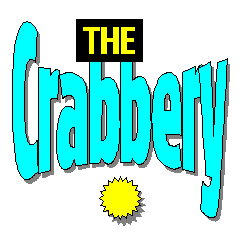
Excerpts from past issues of "The Crabbery"
Vol 3.2, 1st August 1996
The Crabbs of Chardstock
Emily Crabb

The Crabbs of Chardstock
Emily Crabb
Hugh Crabb had married Elizabeth Pope in Yarcombe, Devon in 1824, and Elizabeth had been born there. Out came the book of maps and revealed that Chardstock and Yarcombe were within a stones throw of each other, nestling in that corner of England where Devon, Dorset and Somerset all meet. In fact Chardstock is now in Devon. The registers for Yarcombe were ordered from the local Family History Centre and eagerly awaited. Again they proved fruitful, with children of Hugh and Martha being baptised there in 1807, 1809 and then five all together in 1828, aged 6 to 17. Alas though, there was no Hugh. Many of the children’s names were repeated in Hugh and Elizabeth’s own family. This had to be his parental family, but could I prove it?
From the I.G.I. came the information that Hugh Crabb had married Martha in Thorncombe, Devon, another village in that same area. Maybe Thorncombe parish registers would reveal Hugh’s parents? And so they did! On the 1st July 1804, Hugh Crabb, son of Hugh and Martha was baptised. Not only had this confirmed Hugh’s parents, but also his grandparents and great-grandparents. In fact my tree now stretched back 10 generations, eleven if I could accept an ancestor dying, unremarked, at age 96.
The temptation was to ignore the intervening generations and concentrate on the 17th century, and research did provide some fascinating information. Henry Crabb was there in Chardstock in the Protestation Returns for 1641. His widow, Mary, had five hearths listed in the Hearth Tax Returns in 1664. Her will and inventory from 1889 provide fascinating reading, when she bequeaths, amongst other things, beds, bedsteads, bees, barrels and a shelf!
The latest excitement is only indirectly linked to my Crabb research. In 1669 Hugh Crabb had married Bridget Bowdich in Chardstock. The marriage is listed in the Visitation of Dorset for 1677 and in the 1623 Visitation the Bowdich pedigree stretches back another sixteen generations - now how do I prove that?
 1838-1921
1838-1921Emily’s origins were a bit of a mystery. She had always maintained that she came from Devon, and that her forebears were quite well to do. She is said to have run away with her father’s gardener, James Gilham, from Odiham, Hampshire.
By a stroke of good luck I found there was a one name study for Crabb(e) so wrote to John Crabbe. He kindly supplied suitable references, but there was no Emily born in Devon. However there was an Emily and a Hannah born in 1838 n Chard, Somerset. As for the marriage, it was a runaway affair and the couple subsequently lived in Wandsworth, the obvious entry seemed a marriage in Lambeth, and so it proved to be. Emily was born in Ilton, a village near Ilminster in Somerset, daughter of Hugh Crabb, a cooper, and Elizabeth (Betsy) Pope. In 1841 the family lived in Broadway, 1851 in Donyatt, and by 1861 they were in Ilminster itself but the twins were no longer at home and I have yet to find them. Emily married her gardener in 1863.
Why did she say her origins were in Devon? Census returns give her place of birth as Somerset - Ilton (1871), Devon - Gorkham (1881) and Devon - Ilton (1891). It would appear that Ilton also moved from Somerset to Devon at about the same time that Chardstock moved from Dorset.
The twins obviously remained close throughout their lives. My mother recalls Emily’s visits to the cemetery where she would sit and look forward to the time when she would rest beside her beloved sister, Hannah, no mention being made of her husband! It seemed a good idea to see if this dream was fulfilled as I knew that Emily had died while on a visit to her Daughter in Ipswich, actually in Crabbe Street. Records for Wandsworth cemetery revealed the truth. In the grave were four bodies:- a baby d.1906 (now who were his parents?), James Gilham d.1913, Hannah Jenkins d.1916, and Emily herself d.1921. Her children had respected her wishes and she is buried, as she requested, with her twin sister.
Editor’s note - this proved to be an example of the benefits to be obtained from a one-name study. Out of area searches can often be carried out extremely quickly and easily.